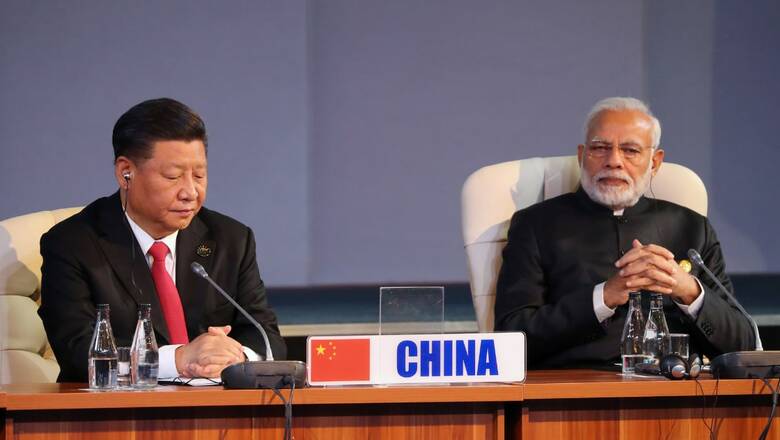
views
Less than a week before the BRICS summit commences in Johannesburg, South Africa, the 19th round of border talks between India and China yielded no immediate breakthroughs, even as the two sides “agreed to resolve the remaining issues in an expeditious manner”.
With Russian President Vladimir Putin skipping an in-person appearance at the summit, India and China will be the two major players and all eyes will be on Prime Minister Narendra Modi and China’s Xi Jinping on whether the two meet.
Personal diplomacy between Modi and Xi is virtually in deep freeze as the Indian Prime Minister has made a point to not bow down to Chinese belligerence, challenged Xi’s expansionist agenda, and essentially refused any cordial meeting with the Chinese president for as long as Xi’s adversarial antics continue.
For China, it will be a momentous loss of face if Modi turns down a one-on-one meeting with Xi at the BRICS summit. Beijing seeks a show of unity at the BRICS summit in a message to the West. It hopes to shine in anti-Western fervour, presenting itself as an alternative to the United States in a world that has been driven to question Western hegemony.
However, the stars may not be aligned for China as India not only stands like a sobering brick wall against it, but it’s also subtly raising the stakes in Taiwan and Tibet. Former Indian Army Chief General MM Naravane highlighted China’s occupation of Tibet and asserted the Tibetan people’s right to return to their homeland.
This came following his visit to Taiwan just days ago where he interacted with Taiwanese leaders. He was joined by former Indian Air Force and Naval chiefs — Air Chief Marshal Rakesh Kumar Singh Bhadauria and Admiral Karambir Singh. Reports say that the Ministry of External Affairs is carrying out a scenario mapping exercise for a future Taiwan Contingency in which Beijing decides to launch a full-scale attack on Taiwan.
It is not just India, but also Brazil that is sending unfavourable signals, putting to rest any prospects of a China-led BRICS. On Wednesday, just days before his meeting with Xi Jinping at the BRICS summit, President Luiz Lula da Silva of Brazil interacted with Taiwanese Vice President Lai Ching-te in Paraguay. The same day, he also praised US President Joe Biden and said that his office had invited Biden to visit Brazil in 2024. These are carefully crafted moves by the Brazilian leader, who has otherwise been critical of the White House for “encouraging” the war in Ukraine and has even griped about the dominance of the dollar.
This should serve as a stark reminder to China that while its BRICS partners may seek economic expediency, they do not see themselves ideologically aligning with the Chinese worldview any time soon.
Evolution of BRICS: India Treads Cautiously
With a highly dynamic geopolitical landscape, the BRICS is entering a phase of accelerated evolution. Previously touted as simply a group of emerging economies seeking a larger share in the world economy, the platform has been taking a politically anti-Western shape driven by Russia and China, sending signals of a BRICS currency, an alternative to the hegemonic dollar. Since then, a plethora of nations have expressed interest in joining the group. India, however, is treading with caution.
India is not too keen on hasty expansion of the BRICS at this juncture — not without due diligence at least. A gradual and calculated approach to admitting new members, based on standards and criteria yet to be defined, and pillared by the support of all founding members, is how India wants to take this forward. It also plans to insist that the new member should support UN Security Council reforms in a bid to dilute China’s objection to India’s inclusion. Both India and Brazil seek a permanent seat at the UNSC.
In some cases, queries from nations on joining BRICS are being treated as applications. External Affairs Ministry spokesperson Arindam Bagchi recently said India has approached the issue with “a very positive mind and a positive framework” while rejecting “insinuations” that the country is against the enlargement of BRICS.
India wants no part in Xi Jinping’s ambition to launch the Yuan as a global currency and transform the BRICS into an ideological union with “Chinese characteristics”. For this reason, India is cautious about the idea of a new BRICS currency.
Cornered by the West, China’s vision of the BRICS entails an anti-Western multilateral forum led by it and bolstered by a frenzied Russia— a nation at war with the West. For India, this is not viable, as despite differences with the West, it has formidable ties with the United States-led bloc of transatlantic nations.
More importantly, at a time when a border standoff and China’s adversarial attitude rages on, New Delhi cannot allow Beijing’s political motives to hijack the BRICS forum. As a legitimate BRICS member, India’s position is balanced and seeks to forward India’s quest to advance the interests of the Global South, paving the way for a multilateral order.
While China aims to capitalise on the current trend of resentment against the West, its bid to lead from the front has met significant roadblocks especially in the form of India, which provides a much more courteous, rather than domineering, leadership of the Global South.
While China’s agenda at the SCO was torpedoed by host nation India, BRICS was a chance for it to assert its predominance. However, India is not only likely to dampen its ambitions in South Africa but is also set to host a grand G20 summit later in September.
In this high-stakes power play, PM Modi’s message to Xi is clear — as long as China’s mischief at the border and in international fora carries on, India will stick to its guns and not allow Beijing to ride roughshod over it.




















Comments
0 comment